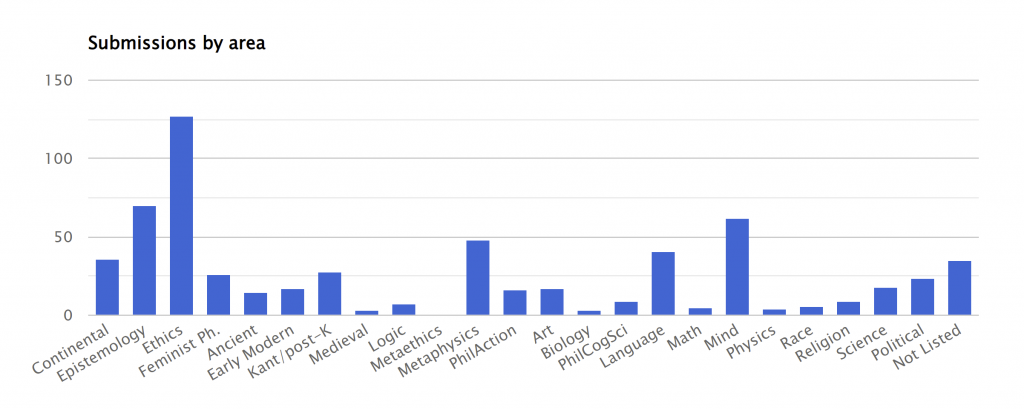Areas/Topics of Submissions to Generalist Philosophy Journals
Some philosophical areas (and topics) don’t show up often in the pages of prestigious generalist philosophy journals. Is it because the journals don’t get many submissions in those areas? (And if so, why not?)
Or is it because the editors of, and referees for, these journals tend to render negative judgments about the submissions they see in these areas? (And if so, are these judgments about quality, or fit, or what?)
Is it some combination of these reasons? Or something else?

[Paint-chip rainbow by Hendra Lesmono, Andreas Junus, and Irawandhani Kamarga]
The actual explanation could influence authors’ publication strategies: if it turns out that a particular journal almost never receives submissions in, say, feminist theory, that may reasonably affect what practical implications an author considering submitting to it should draw from the fact that relatively little work in feminist theory has appeared in its pages.
The explanation could be useful to editors, too, who may have aspirations for broadening the range of subjects their journal covers. It could tell them, for example, about how their conception of breadth matches up with the actual breadth represented in submissions to their journal, or whether they ought to take efforts to encourage more submissions in certain areas (perhaps to counter what they consider to be an outdated picture of what kinds of philosophy their journal publishes), and so on.
One thing needed in order to get clearer about this is data about the subjects of the submissions the journals get. So I contacted a number of highly-regarded generalist journals* to see if they could share their data about the areas, topics, or keywords of submitted manuscripts over the past several years.
As it turns out, most of them couldn’t—because they don’t keep track of this information.
Might I suggest that journals start doing so?
With today’s technology, it should be fairly easy to collect, probably in an automated way, the subfields submissions are in and the keywords authors associate with their articles.
Of the journals that have gotten back to me so far, only one—Ergo—maintains this kind of data (along with other statistics, publicly available here). Below is a breakdown by area of submissions to the journal in 2021:

Editors of generalist journals influence philosophers’ perceptions of their discipline, playing a role, through their publication choices, in establishing what is considered mainstream or important. Getting a sense of the difference between what is submitted and what is published can help us better understand the nature and extent of that influence. As one editor wrote in a reply to my inquiry:
I would be personally interested in the result… since I have tried to be open and encouraging towards increasing the range (in a few respects, including areas/topics) of our submissions. My informal sense is that this has improved, especially over the past few years. Still, maybe that’s just how I want to see the situation.
Specialty journals and their editors, also have effects on career trajectories, publication strategies, as well as influences on philosophers’ perceptions of the subfields they cover, so I think the advice to start collecting subject and keyword data on submissions applies to them, too.
Once set up, this kind of data collection does not seem like it will be especially burdensome, and I don’t see a downside.
Shall we get this going, then? Comments welcome, particularly from journal editors.
(Perhaps what we’ll learn is that, as Brian Weatherson (Michigan) discussed in a different context, “there’s no such thing as a generalist philosophy journal.” What would the upshot of that be?)
UPDATES:
- Brian Weatherson informs me that Philosophers’ Imprint began collecting this information last March, so the journal does not have a lot of it yet. When he has a chance, he will look into making it publicly available.
- John Heil says he will be asking the Journal of the APA‘s publisher, Cambridge University Press, about whether there’s a way to pull from their system recent data along these lines.
* Journals contacted: American Philosophical Quarterly, Australasian Journal of Philosophy, Canadian Journal of Philosophy, Ergo, Journal of the American Philosophical Association, Journal of Philosophy, Mind, Noûs, Philosophers’ Imprint, Philosophical Quarterly, Philosophical Review, Philosophical Studies, Philosophy and Phenomenological Research, and Southern Journal of Philosophy. Not all of the journals have responded yet. If it turns out that one of them besides Ergo tracks submissions subject data, I will update the post indicating so.
Related: Citation Patterns Across Journals, A History of Philosophy Journals Using Topic Modeling



It is not surprising to see epistemology and ethics the highest ranked, as they are the central sub disciplines in the field – and have been since the middle of the 20th century. I am however a bit surprised to see ‘mind’ up there as high as it is, given that most debates in mind seem (e.g., hard problem of consciousness, qualia) to have fizzled out. One area that probably deserves greater coverage is philosophy of action. The coverage of philosophy of language remains roughly appropriate – though it is increasingly unclear whether work in formal semantics work would best be placed in philosophy as opposed to linguistics journals.
It’s just *one* journal. Moreover, that *one* debate seems to have fizzled out (and it’s not obvious it has) doesn’t mean *most* debates have. Philosophy of mind, especially at the intersection with cogsci, is extremely active.
I take it you’re referring to, e.g., such literature as the extended/4E cog and predictive processing debates, and discussions of subpersonal processes. I agree they are thriving. But these debates are better described as in the philosophy of cognitive science – which is great stuff! It’s the humdrum old classic philosophy of mind debates that I am saying have increasingly fizzled out. For example, take Jaegwon Kim’s Phil of Mind textbook and look at what’s in there and then (consciousness, causal exclusion problem, substance/property dualism, behaviourism, blah blah) – and notice that that stuff isn’t getting much prime real estate in the good journals anymore – perhaps because people simply aren’t making very many new interesting moves. In fact, I’d say that the recent hoo-hah about panpsychism is actually getting more discussion than the old bread and butter stuff.
That’s right. I mean also panpsychism, science of consciousness, AI, etc. The mind/cogsci is porous, I think. It’s a good question whether debates will end up migrating from one to the other. As far as Ergo is concerned at least, Mind still has the edge!
Yet another reason why Ergo is the best despite rejecting my submissions.
Just a quick note since this might be puzzling to folks: we just this week added metaethics as a separate category, which is why it appears we had zero metaethics submissions in 2021. Before this week, submissions in metaethics were classified as ethics.
My totally subjective impression is that the big, prestigious generalist journals almost never publish papers on Wittgenstein anymore. Whereas, they will sometimes publish papers on, say, Frege or on Russell (or Hume or Kant etc). Does that fit other people’s impressions?
And if so, what might be the explanation?
(Another subjective impression: it is not uncommon for senior philosophers to allow themselves a bit of an impatient eye-roll at the mention of Wittgenstein’s name. Perhaps this is a justifiable reaction to hero-worshipping, uncritical papers/talks by Wittgensteinians?)
From what I can see, Mind has published one article in aesthetics since July 2003, in October 2020.
That seems like a pretty long gap.
I had a couple more minutes to look around:
Looks like PhilReview published two in aesthetics in 2013, then one in 2019. Also one short one in the history of aesthetics in 2021, although history is a bit of a different beast.
JPhil had one in 2018. Before that, there’s one paper on the cognitive science of imagination in 2014 which might count, depending on how we’re counting. Otherwise, you have to go back to 2011, when there were two (interestingly, one of those was also on the imagination).
I would have thought that philpapers could easily gather this information since it categorises papers according to discipline/sub-discipline, and you can also put specific journals in the advanced search. However, on checking I see that these features can’t be combined. Something to ask Bourget and Chalmers about maybe?
PhilPapers doesn’t know how many papers have been submitted to various journals though – at most it knows how many have been published in those journals.
It’ll also be interesting to compare the submissions by subfields to the accepted papers by subfields. But apart from being interesting, I’m not exactly sure whether this is something good or bad. It may tell us that some fields meet desk rejection more than others, or some scholars reject more of their peers than others, etc. But this is purely a guess.
Interesting suggestion. But it might be difficult to come up with a system of classification that does justice to all the relevant dimensions of this enquiry. For example, I’d be interested to know to what extent journals receive submissions of (1) papers in any of those areas, but that are (whole or in part) based in “non-western” traditions; and (2) papers that are interdisciplinary, whereby philosophy plays a major role. Splitting up ‘Ethics’ into ‘applied ethics’, ‘normative ethics’, ‘meta-ethics’, might already be answering the second question to some extent for those working in ethics.
Currently, when submitting a paper to Analysis, the system says:
Please indicate the area or areas of philosophy below, if any, to which your article belongs. This is for administrative purposes only. The list of topics is not meant to be restrictive. Analysis is happy to publish excellent short papers in any area of philosophy.
Practical Ethics
Normative Ethics
Metaethics
Political Philosophy
Aesthetics
Metaphysics
Philosophy of Mind
Philosophy of Science and Mathematics
Logic
Philosophy of Language
Epistemology
Philosophy of Religion
Philosophical Method
History of Philosophy: Ancient
History of Philosophy: Medieval
History of Philosophy: Modern
History of Philosophy: 20th Century and beyond